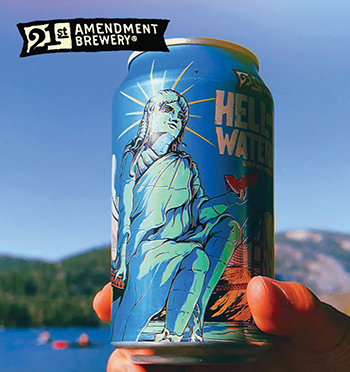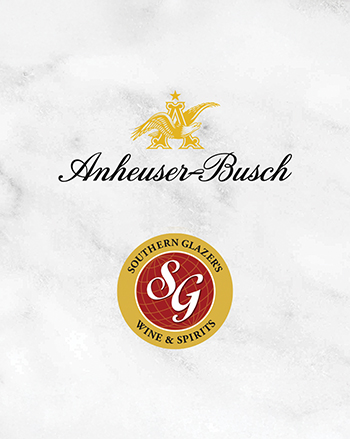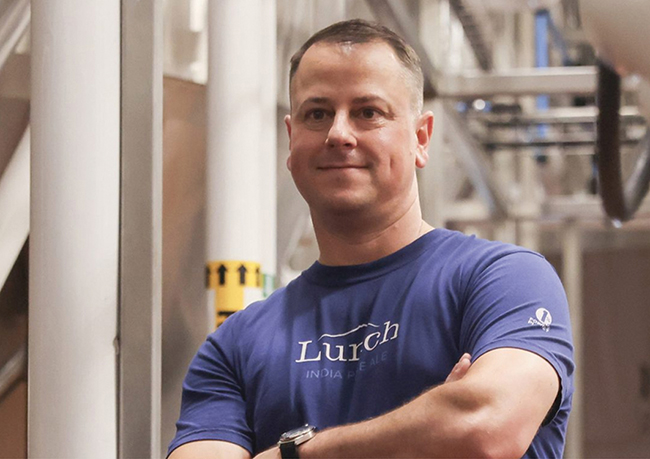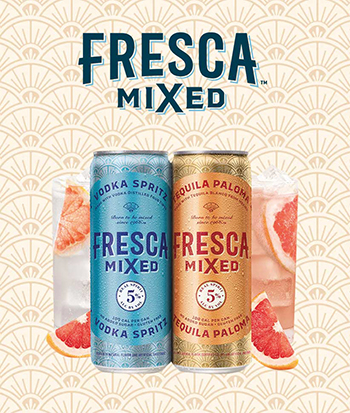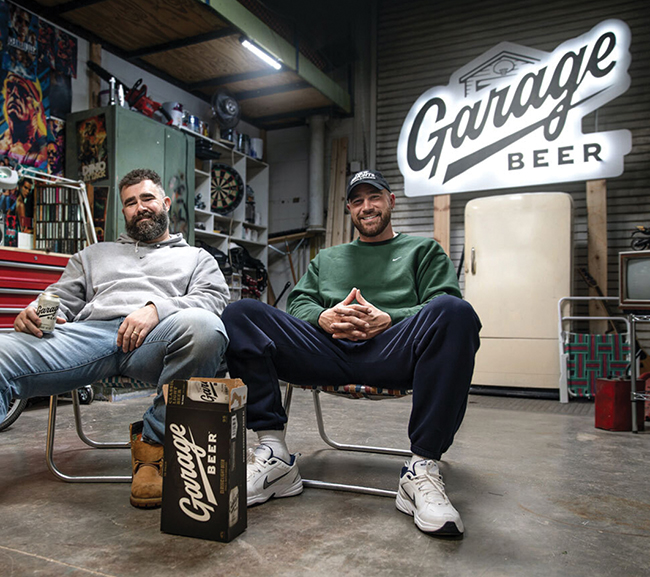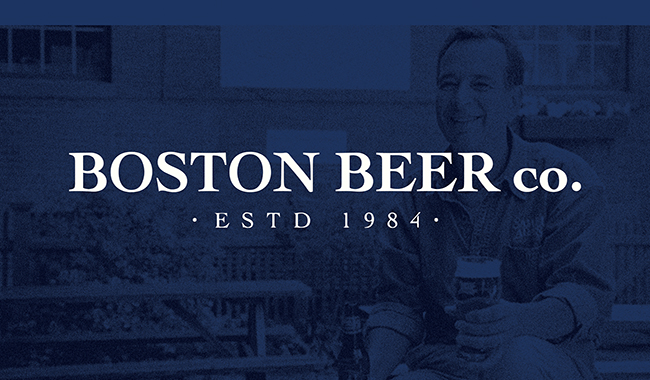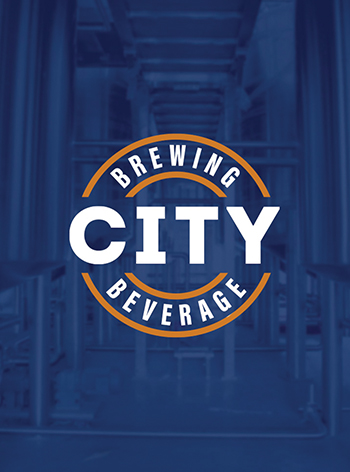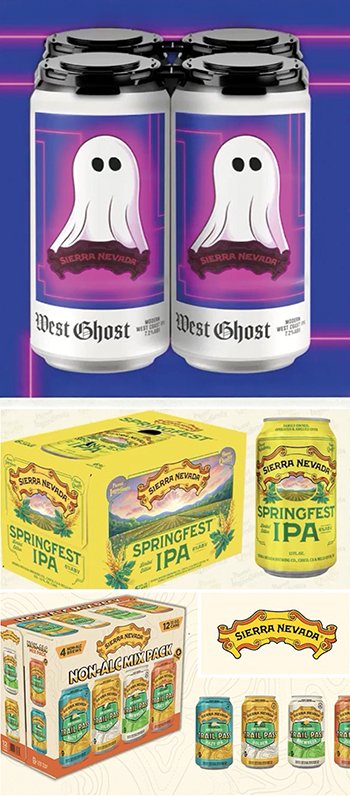Brewscape: The Latest Craft Beer Brand News
21st Amendment to Wind Down Operations and Close Taprooms; Buyer Sought
21st Amendment Brewery is ceasing operations after 25 years, as founders Shaun O’Sullivan and Nico Freccia seek a buyer for the legacy craft beer brand.
The California craft brewery will wind down operations at its San Leandro production facility with a target date to cease operations during the first week of November, Freccia told Brewbound.
The company plans to maintain its taproom at the facility and 2nd Street San Francisco brewpub as long as possible, depending on staffing, before shuttering them, he added.
The news is a reversal of a plan announced by O’Sullivan on social media, which would have seen 21st Amendment’s founders step away from the daily operations and transition to board roles while a new CEO took over with the goal of building a platform.
“A week ago, we were moving in a different direction, and we were excited about a potential path forward with building a platform,” Freccia said. “But it just wasn’t tenable. So a pivot has been made.”
Those plans had been in the works since early July but changed “relatively suddenly,” Freccia explained. A financial lender that 21st Amendment was working with to grow the business ultimately decided against moving forward with the transition due to the industry’s mounting challenges and no “clear path forward.”
“We just thought it was going to be a really good, elegant and optimistic way forward for us and for the brand, with a good steward that was willing to invest, and they were really bullish on the brand too,” Freccia said. “They wanted to grow the brand. We were about to make some hires.
“The lenders aren’t necessarily craft beer people,” he continued. “They’re money people, and they can see the challenges ahead. At a certain point, I think somebody decided ‘We better step back before we get in too deep.’”
Without the lender’s support, 21st Amendment’s path forward became untenable. Freccia said the business has not been profitable for a few years now, and its San Francisco location is operating at about 40% of pre-pandemic business, which Freccia described as “a little microcosm of the bigger world.”
“We built a big facility at a time when the industry was growing rapidly and we were growing 30%, 40%, 50% a year,” Freccia said. “And that growth came to a slowdown and then a standstill right after we opened.”
Freccia and O’Sullivan are still open to exploring a sale of the 21st Amendment brand.
“Our hope is that the brand will live on and there’ll be opportunities coming down the line,” he said.
Declining alcohol sales, moderation trends, tariffs and economic uncertainty added to mounting headwinds facing the business, Freccia said. The 2023 pivot to a co-packing model proved successful early on, but the industry’s increasing challenges this year led to struggles for those partners whose contract volume slowed.
Freccia and O’Sullivan founded 21st Amendment in 2000 as a brewpub within walking distance of Oracle Park, the San Francisco Giants’ home stadium. The company quickly established itself for being among the first craft brewers to can its beers, such as flagships Hell or High Watermelon and Brew Free! or Die IPA.
In 2018, 21st Amendment ranked as the 26th largest Brewers Association-defined craft brewery by volume, with 112,845 barrels of output. The company rode craft’s early 2010s growth wave, with double-digit growth from 2012 through 2015 (according to available BA data, which begins in 2012) when it reached a 100,000-barrel milestone (102,709 barrels).
21st Amendment remained above the 100,000-barrel threshold until the COVID-19 pandemic in 2020, but the company wasn’t able to recover, suffering double-digit volume declines every year since 2019. In 2024, the company produced 23,217 barrels of beer, a 28% YoY decline.
Anheuser-Busch to Sell NYC Distribution Business to Southern Glazer’s
In a tectonic shift in the distribution landscape, Anheuser-Busch InBev (A-B) plans to sell its wholly owned distributor (WOD) in New York City to Southern Glazer’s Wine & Spirits (SGWS).
Once the transaction closes later this year, SGWS will launch Southern Glazer’s Beverage Company of New York, with a footprint covering Manhattan, Queens, Staten Island and the Bronx – all New York City boroughs except Brooklyn.
In the NYC area, Southern Glazer’s will offer A-B’s full product lineup, ranging from beer brands Michelob Ultra, Busch Light, Bud Light and Budweiser to spirits-based RTD offerings Cutwater Spirits and Nütrl Vodka Seltzer, as well as newly launched energy drink brand Phorm Energy.
A-B vet Devyn Dugger will lead operations as senior VP of Southern Glazer’s Beverage Company’s New York division. Dugger most recently served as president and equity agreement manager of Ohio Eagle Distribution, which was sold to Redwood Holdings earlier this summer. That deal is expected to close September 8.
All A-B Bronx employees are expected to be retained, with Southern Glazer’s operating out of the borough’s existing warehouse.
Maine Beer Co. Founder Dan Kleban Launches US Senate Run
Dan Kleban, founder of Freeport-based Maine Beer Co., has entered the race to unseat longtime U.S. Senator Susan Collins.
Kleban is the latest candidate to join a growing field of challengers in the state’s Democratic primary to take on Collins, a Republican, in 2026.
“I’m running for U.S. Senate because politicians in Washington, they’re making it harder to do what’s right for Maine,” Kleban said in a video on his campaign website. “Donald Trump is trampling on the values of Mainers and tearing this country apart. And Susan Collins, she’s been in Washington for 30 years. She stopped looking out for us. She lied about protecting abortion rights, and she refuses to stand up to Donald Trump when it really matters. Enough is enough.”
In the video, Kleban traced Maine Beer’s entrepreneurial roots to the failed policies that created the Great Recession. At the time, he was an associate attorney at a Portland law firm and a hobbyist homebrewer with his brother.
Kleban was laid off in 2008, and channeled his frustration with the corporations whose actions led to a nationwide economic downturn into building a people-centric company with his brother.
“They collapsed our economy and walked away with no consequences,” Kleban said of the big banks. “Hard-working Mainers, they lost their homes, their pensions, and struggled to get by.
“I was angry at the big banks,” he continued. “I wanted to do something. So my brother and I, we set out to prove you could run a successful business by doing what’s right. We promised ourselves that anybody we hired would get a living wage, employee healthcare fully paid, profit sharing and a retirement plan.”
The brothers turned their homebrewing pastime into a career and opened Maine Beer’s first location on Industrial Way in Portland in 2009, with seed money from Kleban’s wife Beth, who cashed out her 401(k).
Other entrants in the Democratic primary to challenge Collins include Graham Platner, a harbor master, oyster farmer and military veteran who has secured the endorsement of Sen. Bernie Sanders (I-VT); and Jordan Hill, chief of staff to former U.S. Rep. Katie Porter (D-CA).
Coca-Cola’s Red Tree Moves Fresca Mixed From Constellation Brands to Sazerac
Sazerac and Coca Cola’s bev-alc subsidiary are embarking on a new partnership.
Fresca Mixed, a ready-to-drink (RTD) line launched by The Coca-Cola Company and Constellation Brands, as well as Minute Maid Spiked, are moving to Sazerac.
Coca-Cola’s “firewalled, wholly owned” bev-alc subsidiary Red Tree Beverages announced in September the transition to Sazerac, which will take over Fresca Mixed as well as a future malt version. The move was reported via a distributor update from Constellation Brands, which Beer Business Daily obtained.
Red Tree said the new partnership blends the subsidiary’s “proven expertise in brand building and marketing with Sazerac’s production excellence, established sales network, distribution management, and enduring brand stewardship.”
Sazerac has made waves in the RTD business after acquiring Southern Champion’s RTD portfolio, including orb-shaped RTD line BuzzBallz, in March 2024. The brand is one of the leading RTDs, particularly in the wine-based segment. Sazerac was among the first major spirit companies to shift its RTD distribution to beer distributors, now giving Red Tree’s beverages a robust distribution footprint.
In 2022, Constellation Brands entered a brand agreement with Coca-Cola to manufacture, market, distribute and launch Fresca Mixed – a spirit-based RTD based on the citrusy soft drink. At the time, Fresca, a zero-calorie soda with citrus-inspired flavors, was the fastest growing soft drink trademark in Coca-Cola’s U.S. portfolio.
Fresca Mixed’s 5% ABV Vodka Spritz will live on under Sazerac, while a Tequila Paloma is being discontinued.
Sazerac will also acquire the Minute Maid Spiked portfolio. Red Tree Beverages debuted the line of multi-serve wine cocktails under the juice brand in spring 2024. The cocktails were produced by LeVecke Corporation, a California-based wine and spirits co-packer, and was distributed by Republic National Distributing Company (RNDC), along with a network of other wine and spirits wholesalers.
The Minute Maid line grew to include a Spiked Vodka Lemonade and Spiked Vodka Pink Lemonade RTD and boosted its number of wine-based flavors, earlier this year.
Minute Maid Spiked marked the first time Red Tree launched a hard product on its own, without collaborating with its other bev-alc partners Molson Coors (Topo Chico Hard Seltzer, Simply Spiked, Peace Hard Tea), Brown-Forman (Jack & Coke) and Constellation Brands. The brand was also Red Tree’s first foray into using wine as an alcohol base.
Garage Beer Takes On Strategic Investment, Constellation Alum Bill Hackett to Join Board
Garage Beer, the light beer brand that achieved national prominence when NFL stars Travis and Jason Kelce invested in it last year, has received “strategic growth investment” from Durational Capital Management.
This funding round, Garage Beer’s first, sets the company’s valuation at “roughly $200 million,” the Wall Street Journal reported. Durational is “a large shareholder” in the brand, but the size of its stake was not immediately clear. The Kelce brothers, who promote the beer on their popular podcast New Heights, will remain “existing owners and operators” in addition to CEO and co-owner Andy Sauer, according to a press release.
With the investment, Garage Beer’s board of directors gains two beer industry veterans: Bill Hackett, former Constellation Brands beer division president and chairman, who retired from the Mexican importer in 2019; and Rich Pascucci, former Pabst chief growth officer. MavenHill Capital chairman and managing partner Rhodes McKee will also join the board.
“Our vision is simple: to make a domestic light beer that resonates with everyone,” Sauer said in the release. “Over the past year, we have increased our volume over 400%, expanded nationally, and became the fastest growing and one of the most exciting beer brands in the U.S.
“Durational’s partnership is a strong endorsement of what we have achieved to date and our ambitions for the future,” he continued. “This investment gives us the resources to accelerate our growth and introduce Garage Beer to even more communities and consumers nationwide.”
Boston Beer Seeking Next $250M Brand Amid 4th Category Failures
Boston Beer Company is willing to fail fast with new fourth category products in order to find its next big brand, founder and CEO Jim Koch shared during the Barclays’ Global Consumer Staples Conference in September.
Koch admitted the company has had “a lot of failures,” joking that he hoped the audience had never heard of discontinued offerings Loma Vista, a tequila-based RTD launched in 2022, or General Admission, a 40% non-alcoholic beer and 60% fruit water released in 2024.
“If we do 10 of those and one becomes a 10-million-case, $250-million brand, I’m good with that,” Koch said. “We’re kind of built around regular failure as a company.”
Boston Beer is letting it ride with more fourth category bets, from Sinless, a zero carb, 100- calorie vodka cocktail line; to Just Hard Squeezed, a 4.2% ABV flavored malt beverage (FMB) made with real fruit juice and alcohol from cane sugar; to Social Pop, which Koch described as an alcoholic version of Poppi.
No other details of Social Pop were shared, and the company declined to offer additional information when asked by Brewbound.
Boston Beer’s new product philosophy comes from hitting big with Truly during the hard seltzer boom and now riding a growth wave with Sun Cruiser, a vodka-based iced tea. After a summer of triple-digit gains, the company is increasing its advertising investment in the latter brand.
Koch acknowledged that growth is expensive, as evidenced by the rush to build Truly. Sun Cruiser‘s ad spend has paid off thus far, giving Boston Beer a “significant new brand,” which he described as “a holy shit thing.”
Asked about the lessons from building Truly that are now being applied to Sun Cruiser, Koch said Sun Cruiser is being built “from the bottom down.” Instead of national ads or programs, the company is zeroing in on the 30 major metros that make up the majority of the brand’s demand. Boston Beer is also focused on building Sun Cruiser in bars and restaurants, which is “more expensive but it builds a stronger brand,” he continued.
Additionally, Boston Beer is more hesitant to add SKUs, Koch said. Where Truly at its peak had seven different flavor families, Sun Cruiser has two (lemonade and tea).
City Brewing Transfers Ownership to Group of Financial Partners, Forms New Board
City Brewing & Beverage has completed a transfer of control to a new ownership group made up of some of the multistate contract manufacturer’s existing lenders.
The move has been in the works for several months as City has attempted to fix its financial situation. Terms of the deal and names of the involved financial partners were not disclosed.
News of City’s money troubles arose in early 2024, when the company overhauled its capital structure to borrow $115 million. Later in the year, Bloomberg reported the company was in negotiations for an additional $50 million loan to help with restructuring efforts.
In January, S&P Global reported City had missed quarterly principal payments on loans due at the end of 2024. City entered into a forbearance agreement with its lenders to temporarily pause payments, and received a $35 million bridge loan.
In March, Bloomberg reported City was considering transferring ownership to its lenders.
The ownership change has allowed City to reduce its debts, lower annual cash interest costs and secure new capital, according to a press release.
With the transfer, City executive chairman David Taylor has stepped down from his position, but will “continue to support the business in the near term to facilitate a seamless transition,” according to the release. The rest of City’s executive leadership team, including CEO Ross Sannes, will remain in their roles, along with a new board of directors.
Sierra Nevada Unveils West Ghost IPA, New Spring Seasonal
Sierra Nevada’s 2026 strategy revolves around a “core four” philosophy involving its top brands, while supplementing its flagships with strategic additions, leaders of the Chico, California-headquartered craft brewery shared during a virtual distributor presentation.
The pillars of that strategy include:
• Hazy Little Thing, which is chasing an eighth consecutive year of growth;
• Pale Ale, a 45-year-old legacy brand the company is committed to returning to growth;
• A fast-growing non-alcoholic (NA) portfolio of Trail Pass NA beer and Hop Splash sparkling hop water;
• And Pils, which started earlier this year as a draft-only release and is now rolling out package to off-premise retailers in 22 states.
Sierra Nevada leaders shared plans for those brands and the company’s trends through the halfway point of 2025. They also revealed a handful of new offerings aimed at engaging new drinkers.
Those new offerings lean into engaging modern drinkers, from a new West Coast IPA to a NA Juicy IPA to a fresh spring seasonal.
Sierra Nevada senior director of innovation and insights Kyle Ingram revealed plans for West Ghost Modern West Coast IPA, which places the company in the 16 oz. can 4-pack space for the first time.
West Ghost (7.2% ABV) is a top-seller in Sierra Nevada’s taprooms and gift shops, and will be introduced into the local liquor store and natural grocery store fray. The beer features a lower malt profile compared to other West Coast IPAs but an amped up hop character, with notes of citrus, tropical fruit and pine flavors and a bitter finish, Ingram said.
West Ghost will begin shipping in February to select markets where the 16 oz. can 4-pack over indexes, Ingram said. Sixteen oz. 4-packs account for 8.5% share of total craft dollars, he noted.
Sierra Nevada has bucked craft’s seasonal trends, with the brand’s portfolio growing 1.8% over the last 52-week period, VP of brand Lesley Albright shared. In 2026, the company is adding a spring seasonal, Springfest IPA, to its existing seasonal portfolio of Summerfest Lager (March-July), Oktoberfest Festbier (July-October) and Celebration Fresh Hop IPA (October-December). The goal is to own every season, Albright said.
Springfest (6% ABV) aims to celebrate farmers and features winter barley. The IPA will begin shipping nationwide December 15 and remain in market through March.
Sierra Nevada is also expanding its Trail Pass NA beer family with the addition of Juicy IPA, available exclusively in a mix pack. The refreshed Trail Pass 12-pack, which also features Hazy IPA, Golden and Breweza, will begin shipping nationwide in March.
Brewveza, a blonde with a hint of lime introduced in late 2024, available exclusively in the mix pack, has been a “standout” with fan demand for individual packs, she added.
“When a beer breaks through, it deserves the spotlight,” she added.
As such, Sierra Nevada will release a standalone Brewveza 6-pack in select markets and through direct-to-consumer channels in March, Albright shared.
A refreshed variety pack for Sierra Nevada’s Hop Splash sparkling water with updated packaging has already hit the market. The goal is to grow from being the No. 3 hop water to the top seller, Albright said.
Those releases will come on the heels of Sierra Nevada’s NA portfolio rising to the No. 2 NA craft brand family, achieving the company’s goal coming into the year, VP of sales Jon Wilks said. He added that Sierra Nevada’s NA offerings collectively hold a 6.6% share of NA craft.
The NA portfolio has also outpaced NA craft trends in the last 52 weeks (Sierra Nevada NA +79% versus total NA craft +28%) and year-to-date [YTD] (Sierra Nevada NA +40% versus total NA craft +18%), Wilks said, citing NIQ XAOC + liquor + convenience data YTD through July 19.
Distribution of Trail Pass increased 88% YTD through mid-July, Albright noted. The goal is to strengthen Sierra Nevada’s NA portfolio and become the top-selling NA brand. That remains a big hill to climb with No. 1 Athletic holding around half of craft NA share.
After launching this spring on draft, 4.7% pilsner brand Pils has cemented a place among Sierra Nevada’s core lineup.
Pils is now in the third phase of its rollout, with a national draft launch August 18 and a package launch on August 25. Now, the company is going nationwide with Pils 8.4 oz. can 8-packs starting January 12, Wilks shared.
Major retailers are on board with Pils’ off-premise roll out, including Safeway, Albertsons, Raley’s, Whole Food, Wegmans, Total Wine, Giant Eagle, Sprouts, Trader Joe’s and Meijer, among others.
Sierra Nevada will be leaning into culinary experiences to promote Pils, including a partnership with the James Beard Foundation to get Pils paired with dishes from top chefs at the organization’s events in major cities, including Los Angeles, San Francisco, Boston and New York City. Fine dining will be a key to Pils’ growth going forward.


Receive your free magazine!
Join thousands of other food and beverage professionals who utilize BevNET Magazine to stay up-to-date on current trends and news within the food and beverage world.
Receive your free copy of the magazine 6x per year in digital or print and utilize insights on consumer behavior, brand growth, category volume, and trend forecasting.
Subscribe